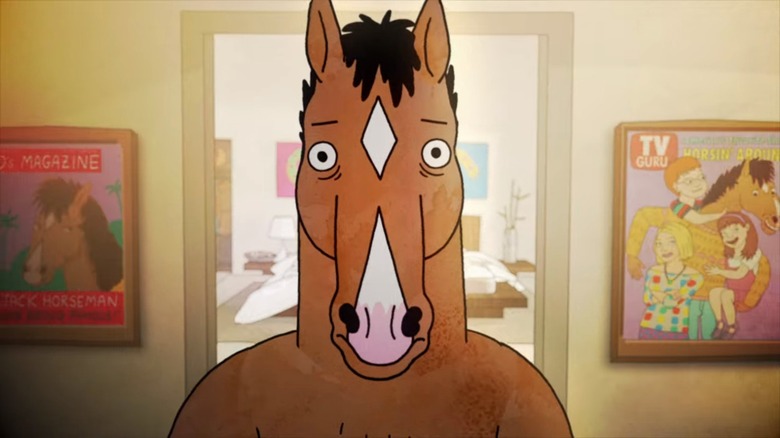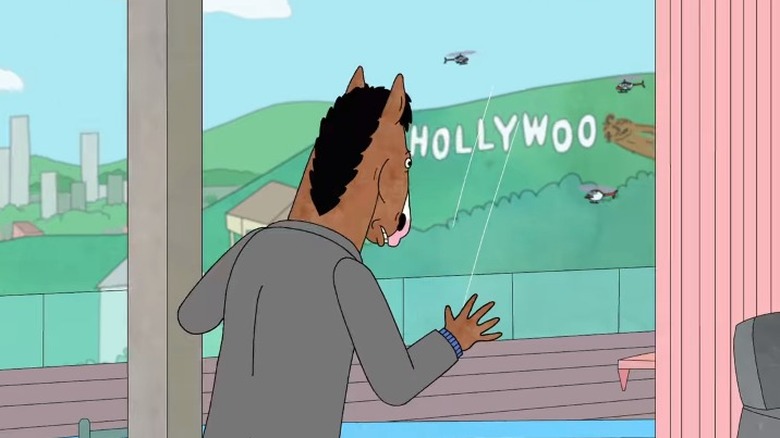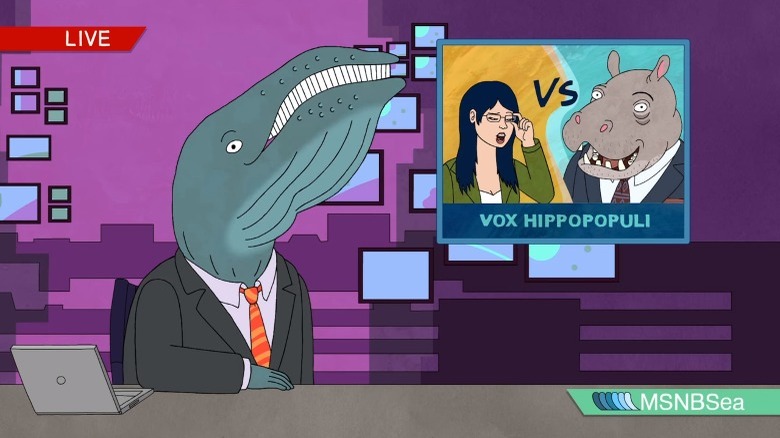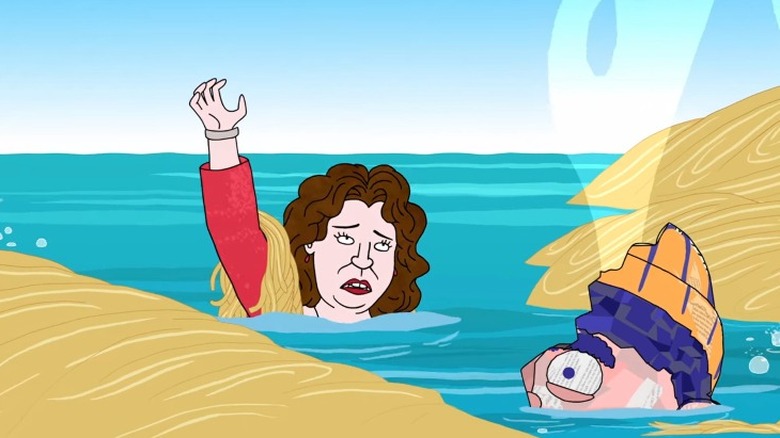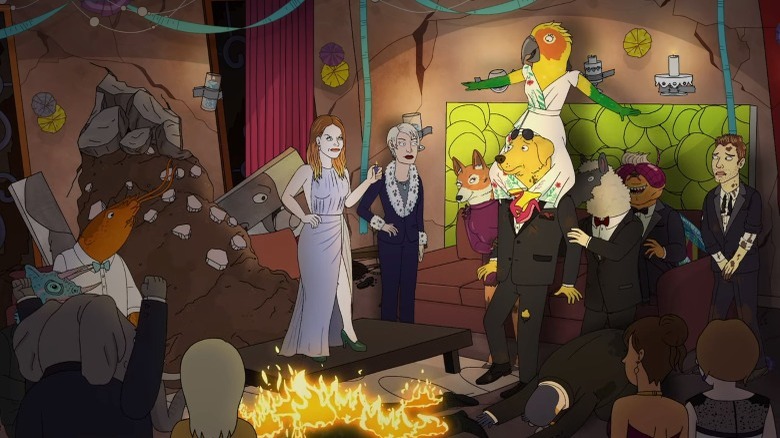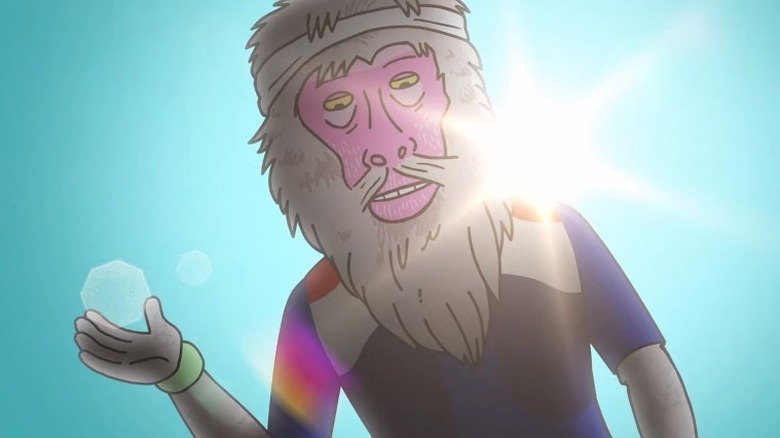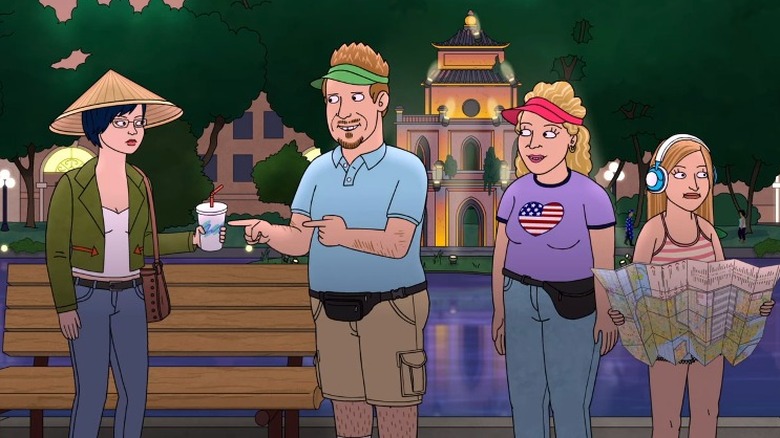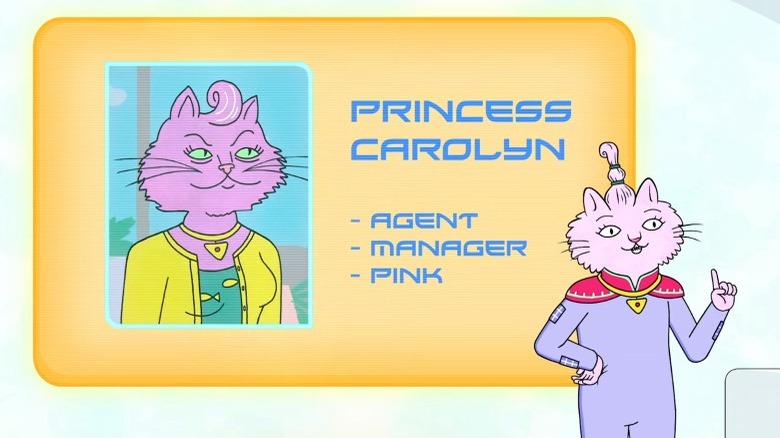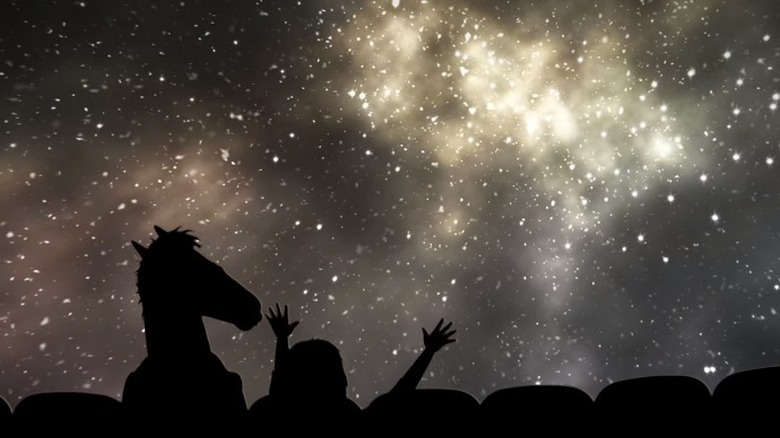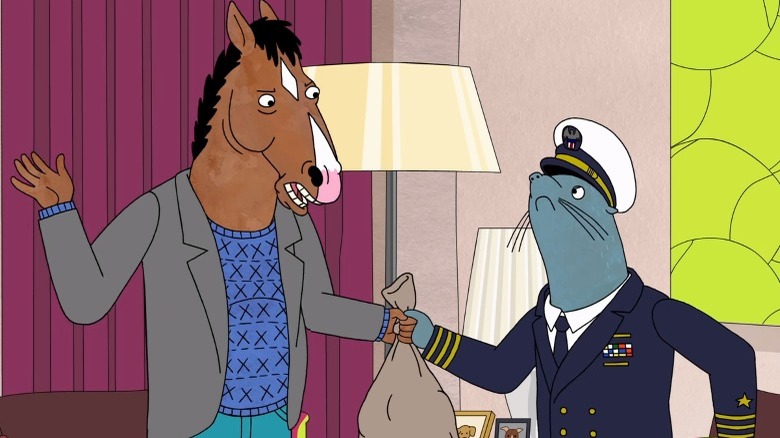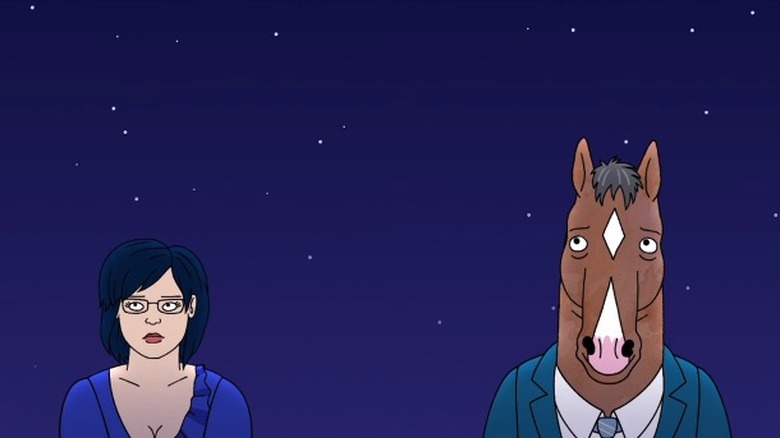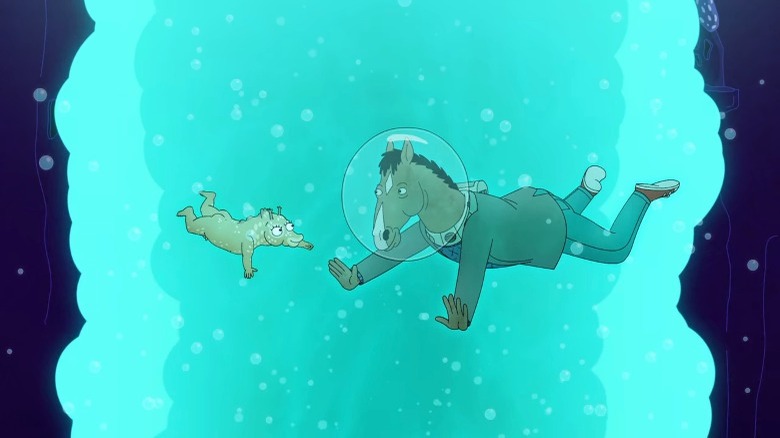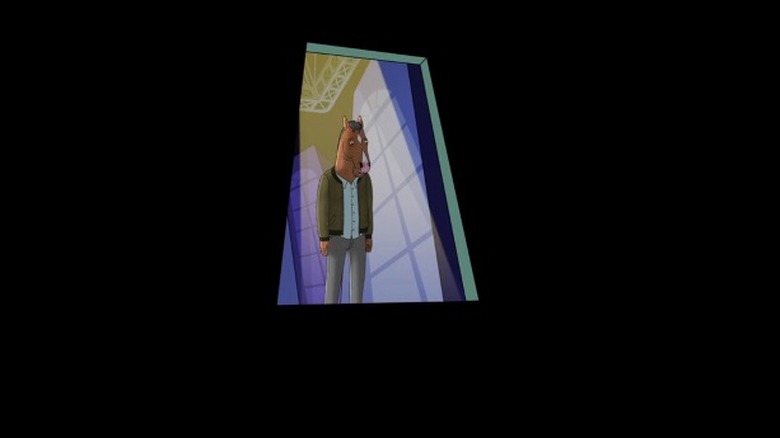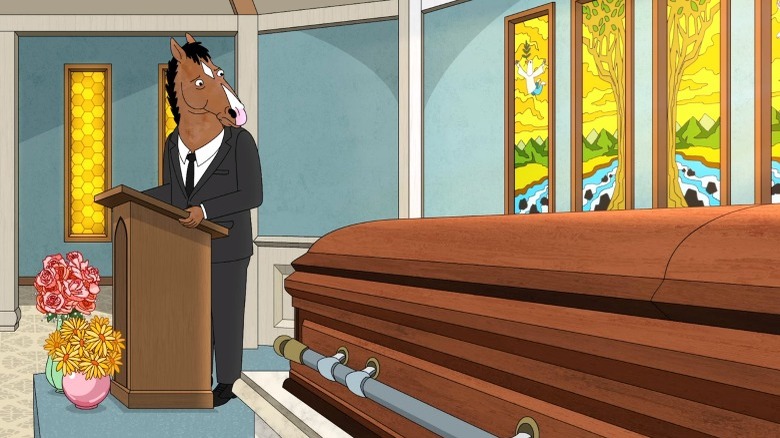The 14 Best BoJack Horseman Episodes, Ranked
This article contains mentions of alcoholism, addiction, suicide, and miscarriage.
Back in the '90s, BoJack Horseman was in a very famous TV-show, but in Netflix's critically-acclaimed "BoJack Horseman," viewers get to know the man (er, horse) behind the sitcom characters: a self-destructive, alcoholic, depressed guy who can't come to terms with the fact that his best days might be behind him. The world of "BoJack Horseman" is a colorful, zany one. Its version of the entertainment industry is much like our own, except this universe is full of anthropomorphized animals living alongside humans. Sometimes, celebrity cameos translate 1:1; after all, how can you improve on Beyoncé? Other times, the show invents new versions of stars we know and love (Quentin Tarantulino is, of course, a tarantula).
It's a silly world to set a series in, made all the more poignant through its juxtaposition with the show's shockingly-dark subject matter. As a viral tweet expertly skewers, on one level BoJack is a cartoon where the cop is a cat named Officer Meow Meow Fuzzyface. On the other, the show is about how "you inherit your parents' trauma but you will never fully understand it." That tension — between kooky animal puns and profound philosophizing — powers the show at its very best. It's also a stylistically-varied show; some episodes get the whole cast together to riff, while others depart from the format to try something bold and experimental. Taking all that into consideration, these are the 14 best episodes of "BoJack Horseman," ranked.
If you or anyone you know is struggling with addiction issues, help is available. Visit the Substance Abuse and Mental Health Services Administration website or contact SAMHSA's National Helpline at 1-800-662-HELP (4357).
14. Our A-Story Is a 'D' Story (Season 1, Episode 6)
BoJack Horseman lives in a version of Hollywood very close to our own, except for the part about it being populated by anthropomorphic animals. There's also the fact that, for the vast majority of the series, they call it "Hollywoo." That's all thanks to "Our A-Story Is a 'D' Story," the sixth episode of the show, which does a great job setting the tone for the kinds of absurdist stories the series would be telling in the future. In this episode, BoJack himself steals the D from the Hollywood sign during a bender. He's desperate not to get caught, so he pawns it off on his rival Mr. Peanutbutter. Unfortunately for BoJack, the media interprets Mr. Peanutbutter's theft of the D as a romantic gesture for his wife Diane. This leads to wonderfully-punny headlines like "Diane receives D," while BoJack is left trying to turn his public image around through a series of stunts.
One such stunt leads to a classic "BoJack" gag that lands this episode on this list; it's one of the best uses of real-life celebrities in the fictional world of Hollywoo. BoJack is desperate to make people like him, so he throws money from a rooftop. Unfortunately, along comes Beyoncé. She slips and falls on BoJack's money, leading someone to exclaim, "American singer-songwriter Beyoncé is hurt!" BoJack does a lot of terrible things throughout the show, but injuring Beyoncé might be one of the worst.
13. Hank After Dark (Season 2, Episode 7)
Halfway through the second season of "BoJack Horseman," Diane is on a book tour to promote her finally-completed biography of BoJack when she accidentally sparks a #MeToo backlash against Hank Hippopopalous, years before #MeToo was actually a thing. This is one of the show's first and best "issue" episodes, where the residents of Hollywoo satirize all-too-relevant sociological themes. It's one of the first in a lineage that would come to include Season 3's "Brrap Brrap Pew Pew" (who can forget Sextina Aquafina singing "Get Dat Fetus Kill Dat Fetus!"), and the following season's "Thoughts and Prayers," where the gang tackles gun violence. The episode features the welcome return of several secondary characters, including Keith Olbermann's news-anchor whale Tom Jumbo-Grumbo. "Hank After Dark" also introduces Christine Baranski's recurring manatee journalist, Amanda Hannity.
Watching "Hank After Dark," it's impressive how the show weaves social commentary into its other, genuinely-funny subplots; by this point in the show's run, it's more than settled into its groove. Diane going off-script puts Mr. Peanutbutter's new game show in danger, jeopardizing the incredibly named "Hollywoo Stars and Celebrities: What Do They Know? Do They Know Things?? Let's Find Out!" It's also the episode where Todd gets involved in a ridiculous, sit-commy "Prince and the Pauper" plot where he accidentally switches places with a literal prince and gives away the fortune of the entire country of Cordovia. And, like many of the best episodes of "BoJack," the episode ends on a sigh.
12. That Went Well (Season 3, Episode 12)
Most of the Season 3 finale, "That Went Well," spends time setting up storylines to come. Here we see the seeds of Todd exploring his asexuality, Diane working in the content mines at GirlCrush, Princess Carolyn's new business as a manager (which is extremely different than being an agent), Mr. Peanutbutter running for governor of California, and BoJack getting out of L.A. for a while in the aftermath of Sarah Lynn's death. What lands "That Went Well" here is its incredible opening act. Character actress Margo Martindale steals BoJack's boat and crashes it into a spaghetti cargo ship, leading to a massive mound of pasta threatening the residents of Pacific Ocean City. "Disaster al dente off the coast of San Clemente!" exclaims Keith Olbermann's news anchor whale, noting that the only way the crisis can be resolved is by someone who has an excess amount of pasta strainers, a fleet of drivers, and a workforce made up of, "say, sexy killer whales?"
Luckily for Pacific Ocean City, Todd and Mr. Peanutbutter have spent the entire season trapped in a non-sequitur of a storyline about an Uber-like rideshare startup. In this one moment, it all culminates in an absurdist gag that finally pays off a season-long joke setup. The episode ends with one of the show's most poignant visuals: a desperately-unhappy BoJack drives out of California, and somewhere in the desert at sunset, he comes upon a herd of horses running wild and free.
11. Underground (Season 4, Episode 7)
BoJack crashes a fundraiser for Mr. Peanutbutter's gubernatorial campaign. Unfortunately for everyone, a fracking-induced earthquake sends Mr. Peanutbutter's mansion crashing through the earth, trapping the entire cast underground. Halfway through the show's fourth season, its grasp on its characters is incredibly solid, and its sense of humor is set. "Underground" shows that the series is at its best when it puts its characters in a room together and lets them all spiral.
"Underground" also contains some of the show's best guest star appearances. RuPaul plays the magnificent queen of an ant colony, while Zach Braff and Jessica Biel play themselves. The latter is an especially good-natured role; other characters refer to her as "you future hard Jeopardy question!" and "that attempted movie star," but she's game for anything. It's a joy to watch her go from 0 to 100, culminating in a desperate play for power where she starts a fire-based worship cult and proclaims, "Tonight, we dine on Zach Braff!" Of course, it wouldn't be "BoJack Horseman" without a devastating philosophical insight, too. This is the episode where BoJack and Diane get absolutely hammered together and open up to one another for the first time in several seasons, leading BoJack to a harrowing realization: "Even if I did get better, the best I could ever be is still just some other version of me."
10. Out to Sea (Season 2, Episode 12)
The second season finale features an all-time classic Todd plot. In this episode, looking for a reason to belong as he often does, Todd joins an improv group. The only problem is ... "Shenanigans" turns out to be a Scientology-esque cult, and before Todd quite knows what's happening, he's landed himself onto a prison ship. BoJack, who is still reeling from his unfortunate time in New Mexico and the news that the studio finished his performance in "Secretariat" via CGI, has to rescue his erstwhile housemate from the clutches of Copernicus, the improv-cult leader.
The episode is solid overall, but it earns its place on this list thanks to its final moments. BoJack, who has taken up jogging as a way to channel his anxieties and energy, reassesses his life throughout the episode. In the last sequence, he collapses while jogging up a hill and is given important, resonant advice from a monkey. "It gets easier," the passerby says. "Every day it gets a little easier ... but you gotta do it every day. That's the hard part. But it does get easier." A classic moment from the show, capping off a classic episode. After two seasons of watching BoJack be self-destructive and difficult, it's a devastatingly hopeful breath of fresh air.
9. The Dog Days Are Over (Season 5, Episode 2)
For most of "BoJack Horseman," writer Diane Nguyen played second-fiddle to a number of other characters. She was the writer of BoJack's autobiography, mostly serving as a sounding board for his depression, and she's Mr. Peanutbutter's wife, acting as the straight man to his over-the-top antics. In Season 5, however, Diane finally gets her starring moment in "The Dog Days Are Over." Like many characters, she's been on a downward trajectory throughout the series; here, after finally divorcing Mr. Peanutbutter, Diane decides to take a trip to Vietnam to reconnect with her heritage.
The episode is structured like one of the listicles Diane writes for GirlCrush, narrating the lessons she learned from her vacation. "The Dog Days Are Over" mines much dramatic irony from the juxtaposition between Diane's actual experiences and how she describes them in upbeat clickbait-voice. "This is not your home," Diane thinks at one point, staring at herself in a mirror while wearing a traditional Vietnamese outfit. "You are a tourist here." A second later, that's exciting material for #2 on her list: "You can be a tourist here!" Alison Brie, who voiced Diane, has since admitted that she regrets taking the part. In a statement posted to Instagram, she wrote, "I now understand that people of color should always voice people of color." While that's certainly valid and is an important thing to recognize, in some ways, this only enhances the sense of dislocation and melancholy in the episode.
If you or someone you know needs help with mental health, please contact the Crisis Text Line by texting HOME to 741741, call the National Alliance on Mental Illness helpline at 1-800-950-NAMI (6264), or visit the National Institute of Mental Health website.
8. Ruthie (Season 4, Episode 9)
By Season 4 of "BoJack Horseman," many of its characters are world-weary and fed up with the ridiculous industry they've chosen to work in. That's perhaps most true for Princess Carolyn, a kitten who has spent decades as an agent for failed celebrities like BoJack. She's had a number of romantic failures, too, including Vincent Adultman — who is definitely not three kids in a trenchcoat, thank you very much. By the time "Ruthie" rolls around, Princess Carolyn is in a stable relationship with a mouse named Ralph Stilton, and she's been trying to get pregnant, eager to have kids so that she can leave some kind of legacy.
This episode is structured around a class presentation given by Princess Carolyn's great-great-great-granddaughter, sometime in the far future. The presentation narrates a particularly-awful day in Princess Carolyn's life, one which contains a number of devastating personal and professional obstacles. As we watch Princess Carolyn try desperately to keep her life together, we think, At least she was able to successfully have a family! That'll make her happy! Sadly, the end of "Ruthie" pulls the rug out from under the audience, revealing that not only has Princess Carolyn miscarried for a fifth time, but that the future-timeline parts of the episode were nothing but a sad fantasy. It's a standout gut-punch of an ending in a series full of them.
7. That's Too Much, Man! (Season 3, Episode 11)
"BoJack Horseman" leaned hard into BoJack's drug and booze-fueled nights, making trippy, upsetting episodes one of its trademark styles. However, few of these episodes are as harrowing as "That's Too Much, Man!," the penultimate episode of Season 3. During this particular self-destructive bender, BoJack reconnects with his "Horsin' Around" costar Sarah Lynn, who has since become far more famous than he ever was. However, she seems just as unhappy as he is, and as the two embark on an odyssey to apologize to Penny, they turn to alcohol and drugs to cope.
In the episode's final moments, Sarah Lynn's titular catchphrase takes on new, incredibly-upsetting meaning. After breaking into the Griffith Observatory planetarium — the emotionally-apocalyptic setting for films like "Rebel Without a Cause" — it becomes clear that Sarah Lynn has indeed taken too much, man. While BoJack calls her name into the darkness, repeating, "Sarah Lynn? ... Sarah Lynn?" we realize that the wild-child child star has, unfortunately, overdosed. "BoJack Horseman" had certainly been dark before this episode, but here the show went dark. This is a show about addiction, after all, and in "That's Too Much, Man!" the show acknowledges the unfortunate reality that sometimes, addiction wins.
If you or anyone you know is struggling with addiction issues, help is available. Visit the Substance Abuse and Mental Health Services Administration website or contact SAMHSA's National Helpline at 1-800-662-HELP (4357).
6. BoJack Hates the Troops (Season 1, Episode 2)
A lot of the best episodes of "BoJack Horseman" are its emotionally-heavy ones, but "BoJack Hates the Troops" shows the show at its funniest. This is the episode where BoJack causes a media firestorm by taking the last muffins from a guy at a grocery store, who turns out to be Neal McBeal the Navy SEAL. (He is, fittingly, an actual seal too.) This is a classic episode that keeps piling on the absurdity, and it tackles political issues in a way the show would continue to do. It's incredible to look back and realize that it came so early in the show's run, as self-assured as it seemed. Patton Oswalt provided the voice for a number of memorable characters throughout the show's run, but his righteous indignation as Neal McBeal might just be his best performance in the series.
This episode does a fantastic job setting up the absurdist media landscape that our formerly-famous horse finds himself in. No matter what he says or does to try to dig himself out of the hole he's created, BoJack only seems to make things worse. (Shockingly, going on television and delivering a monologue about how "a lot of the troops are jerks" doesn't help his case!) Each new twist and turn in the controversy is reported on breathlessly by Keith Olbermann's Tom Jumbo-Grumbo, who works for MSNBSea, and the rapid-fire wordplay throughout the episode gives a delightful preview of the complex jokes to come.
5. Escape from L.A. (Season 2, Episode 11)
One of the biggest themes of "BoJack Horseman" is regret. Its central character often finds himself wondering what could have been — who he could have been — if he'd only made different choices in his past. Throughout Season 2, BoJack recalls flashes of a pretty deer named Charlotte, but it's not until the season's penultimate episode that we finally meet her. Charlotte lives in New Mexico, and BoJack takes his boat (the "Escape from L.A.") out to visit her for a while. It's a format-breaking episode, the first time the show has left Los Angeles for an entire installment, and it signals a series increasingly willing to experiment.
During his time there, BoJack grows close with her daughter Penny, and we watch with growing horror as he puts himself in increasingly-compromised positions with the teenager. Finally, after the two attend a school dance, Charlotte walks in on BoJack and Penny curled up together. Despite Penny's protestations that nothing happened, Charlotte orders BoJack to leave town, dropping one of the show's most expertly-deployed f-bombs: "If you ever try to contact me or my family again, I will f—ing kill you." His relationship with one of the best things in his life ruined, BoJack heads back to Hollywoo. The sihouette of the "Escape from L.A." racing along the freeway while mountains pass by in the background is one of the show's most beautiful visuals, made all the more impactful coming right after such a gut-punch.
4. Nice While It Lasted (Season 6, Episode 16)
For my money, the series finale of "BoJack Horseman" is one of the best series finales of all time. The episode begins with the news that BoJack has survived a near-fatal overdose, but was sentenced to fourteen months in prison for breaking into his old house. He is granted a weekend release to attend Princess Carolyn's wedding, which gives the show a handy opportunity to check in with the cast one last time, sending them off into futures both uncertain and surprisingly wholesome. Mr. Peanutbutter is successful; Todd is still riding that line between stupid and profound; Princess Carolyn is finally, after all this time, letting herself believe that she deserves to be happy. And through a comedic series of mishaps, Hollywoo calls itself Hollywoob now. Not perfect, but ... closer.
The last act is a two-hander between BoJack and Diane. As they try to catch up after a long time without seeing one another, they are talking around and through years of hurt. The dialogue and vocal performances here are exceptional. Alison Brie does some of her best work in the series, communicating a world of pain and longing in her pauses and false starts. "Hey, wouldn't it be funny if this night was the last time we ever talked to each other?" BoJack asks. We don't know if that's the case, but the show leaves the two of them staring up at the stars, their silence saying more than words ever could.
If you or anyone you know is struggling with addiction issues, help is available. Visit the Substance Abuse and Mental Health Services Administration website or contact SAMHSA's National Helpline at 1-800-662-HELP (4357).
3. Fish Out of Water (Season 3, Episode 4)
I still remember the sense of awe I felt when I realized what "BoJack Horseman" was doing in "Fish Out of Water." In typical "BoJack" fashion, the episode subverts our expectations of the title; in actuality, BoJack himself is the metaphorical fish out of water — that is, a character in an unfamiliar location — and he's in the water for the majority of the runtime. Funny, but not necessarily awe-inspiring, right? At this point in the overall series narrative, BoJack is promoting his dream role in the "Secretariat" biopic. He is sent to Pacific Ocean City, an underwater metropolis full of anthropomorphic sea creatures, for a film festival. The horse has to wear a helmet so he can breathe, and it renders him inaudible to the other characters; their attempts at speech are heard by BoJack (and us) as mere gurgling. This means that the vast majority of "Fish Out of Water" is dialogue-free.
After a series of mishaps, BoJack instead finds himself caring for a newborn seahorse, exploring the underwater world in a succession of stunning vignettes as he tries to reunite the baby with its family. It's a breathtaking showcase for the series. The episode was so well-received that it garnered nominations for the Annie Awards, the Golden Reel Awards, and the WGA Awards. The animation is gorgeous for the usually-flat show, especially in the sequence where BoJack and his charge find themselves in a bioluminescent cavern; it's a moving, audacious episode of television.
2. The View from Halfway Down (Season 6, Episode 15)
As "BoJack Horseman" careened toward its series finale, its central character spinning out of control, fans wondered whether BoJack might not survive the series. In "The View from Halfway Down," BoJack himself wonders the same thing. Seemingly mid-bender, he finds himself trapped at a haunting dinner party somewhere between life and death. "I kept having this dream where I was having dinner with all the people who were gone, and I thought, 'I should do that!'" he tells former creative partner Herb Kazzaz, who died in Season 2. The opening act is a who's-who of people BoJack has lost along the way: Sarah Lynn is there, and so are BoJack's parents. So, too, is Zach Braff, who was memorably burned alive in "Underground."
Throughout the first part of the episode, while the characters debate the meaning of their lives and deaths, BoJack notices black goo dripping from the ceiling. He eventually learns that it's "nothing," the nothingness that awaits him on the other side. It's a harrowing thought, perhaps the most existential the series ever got: what if, after we die, there's just ... nothing? As if that's not enough, BoJack's growing terror peaks with a poem. It's a suicide note of sorts, with Secretariat realizing he regrets his fatal jump. "But this is it; the deed is done. The silence drowns the sound," he pleads. "Before I leaped, I should have seen ... the view from halfway down." Cue the tears. Thanks, funny horse cartoon.
If you or a loved one is in crisis, please reach out to National Suicide Prevention Lifeline at 1-800-273-TALK or the Crisis Text Line (Text TALK to 741741) to talk to someone who can help.
1. Free Churro (Season 5, Episode 6)
Like "Fish Out of Water," I still remember how impressed and overwhelmed I was when I realized what "Free Churro" was doing. At this point in the series' run, we have been following the fallout from BoJack's troubled childhood throughout the entire show, witnessing the effect that Beatrice Horseman's steely, cold method of parenting had on the self-destructive horse we've come to know and love. And now, she's finally gone. Aside from a pre-credits flashback, the entirety of this episode consists of BoJack's eulogy for his mother. The episode is basically one long monologue, expertly delivered by Will Arnett (who won an Annie for it), and it's devastating in a way that only a show that's put in five seasons' worth of work can be.
It's an exercise in cringe comedy as much as it is a stunning piece of emotional writing. BoJack gets no laughs from the funeralgoers when he jokes about Beatrice's face being "forever frozen in horror," and he goes down several extended tangents, trying to make sense of who he is now that he doesn't have his mother in his life. "My mother is dead and everything is worse now," he says. Like many episodes of "BoJack," this one ends with a gut punch. After spinning out the tale of the free churro he got at Jack in the Box that morning, after describing his mother's final moments and his own anguish, BoJack realizes that he's just poured his heart out ... to the wrong room.
